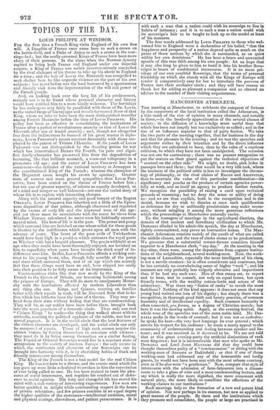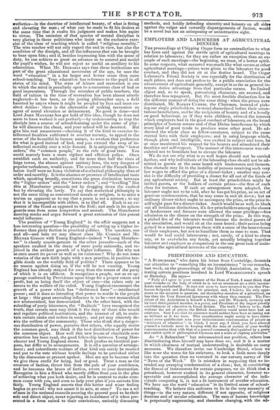MANCHESTER ATHENEUM.
THE meeting at Manchester, to celebrate the conquest of fortune by the supporters of the local institution called the Athenaeum, is a tide-mark of the rise of opinion in many channels, and notably in three,—in the brotherly approximation of the several classes of society ; in the diffusion of a knowledge more useful than that which has been not inaptly but too exclusively so called ; and in the rise of an influence superior to that of party faction. We take the two parts of the meeting together, that for business in the day and that for pleasure in the evening; and we test the speeches and arguments rather by their intention and by the direct influence which they are calculated to have, than by the rules of a captious criticism, to which they have not been unsubjected. The occasion was not one for controversy ; there was no present antagonism to put the orators on their guard against the technical objections of " counsel on the other side." We might, no doubt, pick holes in passages here and there ; but that would be a very idle task, where the business of the political critic is less to investigate the chrono- logy of philosophy, or the rival claims of BACON and ARISTOTLE, than to ascertain the value of this particular manifestation—its significancy and pondus as the produce of certain agencies power- fully at work, and as itself an agency to produce further results. We recognize the possibility of raising a cavil upon technical grounds of reasoning; but we deny the sense or utility of doing so: and we are thus explicit, both in the recognition and in the denial, because we wish to dismiss at once such qualification as deference for dry or unfriendly precisionists may make neces- sary, without mingling it among the more generous reflections which the proceedings at Manchester naturally excite.
To the managers of meetings in the agricultural districts, the domain of that ancient and hereditary civilization to which Mr. DISRAELI alluded in his admirable speech, the day at Manchester, rightly contemplated, may prove an instructive lesson. The Man- chester Athenaeum consists mainly of the youth of what are called the middle classes, and the race of clerks seems to be predominant. We presume that a substantial tenant-farmer considers himself superior to a Manchester clerk, "any day." At the meeting in the day-time, there were, among the deputations from cognate institu- tions of the neighbourhood, several working-men. Now, the work- ing-man of Lancashire, especially the more intelligent of his class, is not a servile creature : he is often considerate and courteous, but he has certainly no overwhelming sense of higher "rank "; and his manners are very probably less vulgarly obtrusive and impertinent than if he had any such awe. Men of that stamp sat, to report and to hear, and to consult, not only on equal terms, but upon friendly terms, with the wealthy cotton-lords and scions of thb aristocracy. Was there any "fusion of ranks" to revolt the most fastidious ? Nothing of the kind appears: it does not seem that any young lord waived one iota of his dignity ; but simply there was a recognition, in thorough good faith and hearty practice, of common humanity and of intellectual equality. Such common humanity is often conceded, pro forma, as a dogma of Christian morals; but here it was the moving spirit. Again, at the evening festival, the whole tone of the speeches was of the same noble kind. Mr. Dm- RAEL1 spoke in the words of counsel; but it was not ex cathedra: he spoke his best—the very best language he ever uttered; which attests his respect for his audience : he made a manly appeal to the community of understanding and feeling between speaker and lis- tener; and it was received as it deserved to be. We are not told that at this great evening-party the artificial distinctions of rank were forgotten ; but it is inconceivable that men who spoke as Mr. DISRAELI and Lord JOHN MAxsuits did that day could have thought themselves guilty of a " condescension " at sitting with the working-men of Ancoats or Dukinfield ; or that if one of those working-men had addressed any of the honourable and lordly guests, he would not have been met with the most urbane courtesy, even as if he also were "a gentleman." Now, compare that style of intercourse with the admission of farm-labourers into a dinner- room to take a glass of wine and a most condescending lecture, and say which is really the more dignified, the more consonant with natural piety, the more likely to conciliate the affections of the working-classes to our institutions ?
Such meetings help to the formation of a new and potent kind of opinion. Not new perhaps in its essence, but new as applied to great masses of the people. By them and the institutions which they promote and consolidate, the people at large are practised in aesthetics—in the doctrine of intellectual beauty, of what is fitting and elevating for man ; of what can be made to fit his desires at the same time that it exalts his judgment and makes him aspire to virtue. The omission of that species of mental discipline is very glaring in those politicians who insist on the exclusive exer- cise of the class of teaching which is called " religious morality." The wise teacher will not only regard the end in view, but also the condition of the disciple, and all the influences that can be brought to bear upon him ; and if, besides impressing him with the sense of duty, he can achieve so great an advance as to control and model the pupil's wishes, be will not reject so useful an auxiliary to his admonition. When Mr. Disaang says that these institutions are part of the great educational movement of the age, he uses the word "education" in a far larger and better sense than mere school-teaching. True education has reference to the pupil in all states of his mind. The state of leisure and recreation is one in which the mind is peculiarly open to a numerous class of bad or good impressions. Through the mistakes of public teachers, the field of tuition in the time of recreation has been almost utterly neglected—it has been, as the jesting philosopher says, a field haunted by satyrs where it might he peopled by fags and most ex- alted deities : there is the alternative of making recreation an agent of moral elevation or debasement. No good is done—and Lord JOHN MANNERS has got hold of this idea, though he does not seem to have worked it out perfectly—by endeavouring to trap the disciple into a course of school-learning under the name of play : he will discover the cheat, and your school will be deserted. But give him real amusement—choosing it of the kind to exercise in- tellectual faculties cultivated in another nursery, to appeal to the sense of the beautiful in human nature, to awaken that preference for what is good instead of bad, and you extend the sway of in- tellectual morality over a wide domain. It is subjecting the "lower orders," the " common people," to the rule of good taste. You could scarcely have a more vigilant and efficient police. Once establish such an authority, and far more than half the vices of large towns, the abuses against sanitory laws, the very dangers of popular turbulence, would cease. The excesses of the French Revo- lution itself were no less a violation of msthetical philosophy than of order and morality. It is the absence or presence of intellectual taste which, speaking broadly, constitutes the great distinction between the "higher orders" and the "lower orders "; and " levelling " like this at Manchester proceeds not by dragging down the exalted but by elevating the lowly. To say that msthetical philosophy is not the same thing as conventional morals or religion, is to utter a truism as apparent as to say that a poem is not a sermon ; to say that it is incompatible with either, is to libel all. Each is an ex- ponent of the Good as opposed to the Evil; and each in its sphere guards man from some temptation and assault. The Manchester meeting marks and urges forward a great extension of this potent social influence.
The position of "Young England" in the affair suggests not a less interesting question—the possibility of setting up a higher in- fluence than party faction in practical politics. The speakers, one and all—and here we may almost class Mr. Conners and Mr. MILNER GIBSON with Young England—indeed "Young Manches- ter" is clearly cousin-german to the other juvenile—each of the speakers exulted in the decay of mere party animosity, and re- joiced in the evident growth of a higher influence. But why not at once assert its power as well as its existence ? Why do not some votaries of the new faith begin with a new practice, in positive tan- gible deeds on the worldly field of politics ? There appears to be no reason against doing so, if the will be not wanting. Young England has already strayed far away from the tenets of the party of which it is an offshoot. It recognizes a people, not as an ap- panage conferred by Providence upon kings for a proper estate and profit, but as being itself the object of care—the rulers only as means to the welfare of the ruled. Young England encourages the growth of a power which has "dethroned force" —intellectual power ; and it does so intending that power to reside in the people at large : this great overruling influence is to be—not monarchical nor aristocratical, but democratical. On the other hand, with the subsiding of party bitterness, the Radicals" have recognized the truth, that certain men may think it the duty of those who mould and regulate political institutions, and the interest of all, to main- tain certain ranks and orders in society, and yet may sincerely de- sire the welfare of the community. Those who think that a danger- ous distribution of power, perceive that others, who equally desire the common good, may think it the best distribution of power for the common object. How well this new lesson of charitable con- struction has been read, the good fellowship between Young Man- chester and Young England shows. Both profess an identical pur- pose, but differ as to arrangements. It is all a question of arrange- ment; and subordinate matters of that kind can surely be mooted and put to the vote without hostile feelings to be provoked either by the discussion or present upshot. Men are apt to become what we give them credit for being, bad or good. Treat a man as the creature of faction, thrust him from the pale of your confidence, and he becomes the bravo of faction, sworn to your destruction. Recognize in him a friend who merely differs from you in the plan of achieving what you both desire, and he is content to make com- mon cause with you, and even to help your plan if you outvote him fairly. Young England asserts that this better and wiser feeling begins to prevail: why not assert it in acts, at once ? To see a set amen in the national councils avowing the general good to be their sole and direct object, never rejecting an instalment of it when pre- sented in a form suited to their convictions, amicably discussing
methods, and boldly defending sincerity and honesty on all sides against the vulgar and cowardly disparagements of faction, would be a novel but not an unimposing or uninstructive sight.



























 Previous page
Previous page